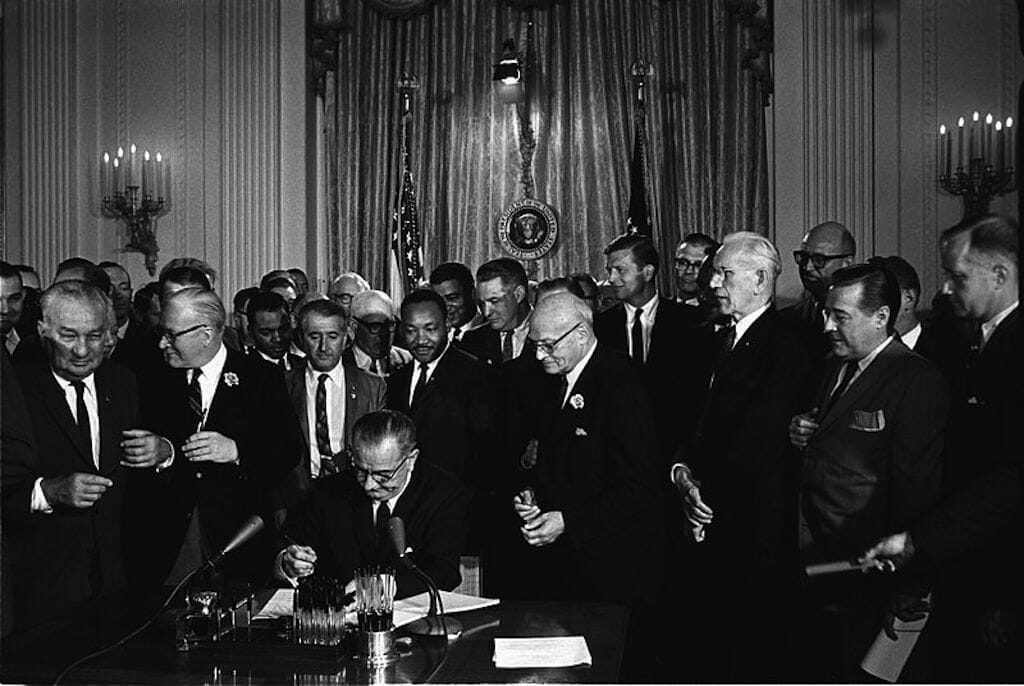Rural Whites Shielded From Medicaid Work Requirement Rules
As is often the case when it comes to Trump administration policies, Americans of color stand to lose. President Lyndon Johnson signing the Civil Rights Act of 1964. The new proposal for Medicaid work rules may violate Title 6 of the landmark labor law, which bans race-based discrimination in federal poverty-assistance programs. (White House Press Office)
President Lyndon Johnson signing the Civil Rights Act of 1964. The new proposal for Medicaid work rules may violate Title 6 of the landmark labor law, which bans race-based discrimination in federal poverty-assistance programs. (White House Press Office)
In April, President Trump signed an executive order allowing some Medicaid recipients to be exempted from requirements that they find jobs or lose their health insurance. Now, the states taking advantage of the order, called “Reducing Poverty in America,” are facing scrutiny for allegedly creating policies that, as Talking Points Memo (TMP) reports, “would in practice shield many rural, white residents from the impact of the new rules.”
Kentucky and Ohio are applying for the waivers that the executive order allows. Each of their proposals include exemptions for the counties with the highest unemployment, which happen to be mostly white, GOP-voting and rural. In contrast, according to TMP, “many low-income people of color who live in high-unemployment urban centers would not qualify, because the wealthier suburbs surrounding those cities pull the overall county unemployment rate below the threshold.”
Those urban areas may have unemployment rates equal to or worse than the counties exempted from the requirements, but they’re not white and they don’t vote Republican.
As Sarah Rosenbaum, a health law professor at George Washington University, told TMP: “This is sort of a version of racial redlining where they’re identifying communities where the work requirements will be in full effect and others where they will be left out.” She continued, “When that starts to result in racially identifiable areas, that’s where the concern increases.”
In addition, these waiver proposals may violate Title 6 of the Civil Rights Act of 1964, which bans race-based discrimination in federal poverty-assistance programs.
Kentucky’s waiver, which was approved in January, will first be imposed in northern Kentucky, which has a higher proportion of black residents than the rest of the state.
Even before these waiver proposals, Trump’s executive order was already under fire from anti-poverty groups for placing undue burdens on Americans who are already struggling to make ends meet, and, critics say, perhaps over-inflating the number of people on Medicaid who don’t work. As The New York Times reported in April:
A 2017 study of Michigan’s Medicaid program by the University of Michigan Institute for Healthcare Policy and Innovation found that three-quarters of those enrolled in the program were already working or physically unable to do so. Another 12 percent were people likely to be exempt, including the elderly and students.
In fact, “It’s a little bit of a solution in search of a problem,” Elaine Waxman said of the work requirements. Waxman is a senior fellow with the nonpartisan Urban Institute and has studied food assistance programs and other government entitlements.
A federal court challenge to Kentucky’s waiver is set to be decided in June.
Your support is crucial...As we navigate an uncertain 2025, with a new administration questioning press freedoms, the risks are clear: our ability to report freely is under threat.
Your tax-deductible donation enables us to dig deeper, delivering fearless investigative reporting and analysis that exposes the reality beneath the headlines — without compromise.
Now is the time to take action. Stand with our courageous journalists. Donate today to protect a free press, uphold democracy and uncover the stories that need to be told.






You need to be a supporter to comment.
There are currently no responses to this article.
Be the first to respond.